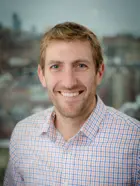Following Up: Kris Ansin ’17, TechnoServe
Ansin, a graduate of the full-time MBA program, is tapping private sector practices and relationships to address poverty in Kenya, and learning the power of mentorship along the way.
In this series, Karen Guzman checks in with recent Yale SOM alumni to learn how their Yale SOM education has shaped their career paths since graduation.

Kris Ansin ’17
Kenya Country Director, TechnoServe
How have you pursued your aspirations to make a difference in your career so far?
SOM was a great jumping off point. I had come from a more traditional social impact/international development space, and SOM really helped me approach the intersection of business and society.
I’ve held two major roles since SOM. For nearly five years, I worked with Accenture Development Partnerships, supporting international NGOs, foundations, bilateral agencies, and social enterprises. A few highlights include starting a public-private healthcare partnership in Kenya; shaping a technology training and job placement program for students with disabilities; mapping the fish value chain in east Africa; and developing a partnership strategy for a global NGO focused on child health and rights.
In 2022, I took a new opportunity with TechnoServe, an NGO that leverages private sector practice and relationships to alleviate poverty, mostly through efforts around food systems and entrepreneurship. I serve as country director in Kenya and I’m responsible for growing and strengthening our program portfolio—shaping new opportunities with partners and donors, managing a growing team of 130+, and myriad other responsibilities in a general leadership role. I love it and I’m enjoying life and community in Kenya. I hope some SOM classmates will come pass through!
What’s a lesson from Yale SOM that has helped you on your career path?
So many. A few I’ve leaned on most heavily:
- Leave the campsite better than you found it.
- Sometimes, to use a baseball analogy, it’s not about trying for home runs. Often situations just call for trying to hit singles and doubles, particularly in managing some of the more complicated challenges that cross my desk.
- Overall, I find I’m calling on and leveraging concepts from my courses on strategy, behavioral economics, and interpersonal dynamics.
Have there been unexpected benefits from your SOM education?
I didn’t realize just how many ways the SOM network would prove meaningful. It was through the network that I was first introduced to TechnoServe. The network provided me a built-in social and professional community in New York and in Nairobi. And through the network, I’m able to reach out to former classmates when I’m facing technical or situational challenges that I needed support addressing.
I’ll also say that SOM’s emphasis on gaining experience across sectors—private, public, and social—has helped me pursue the right types of training and experiences to achieve meaningful progress in my work.
What are you passionate about in your work?
Coaching and mentoring come to mind lately. I get in trouble when I try to do too many things myself. I end up with an impossible, unachievable task list. So being an effective coach to my team, putting them in the position to succeed while trying to alleviate barriers in front of them, is critical to our success and satisfaction.



